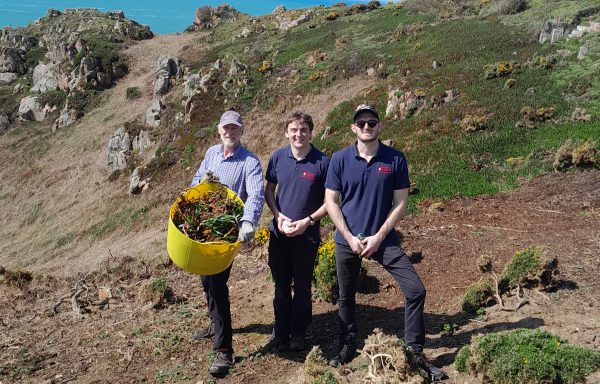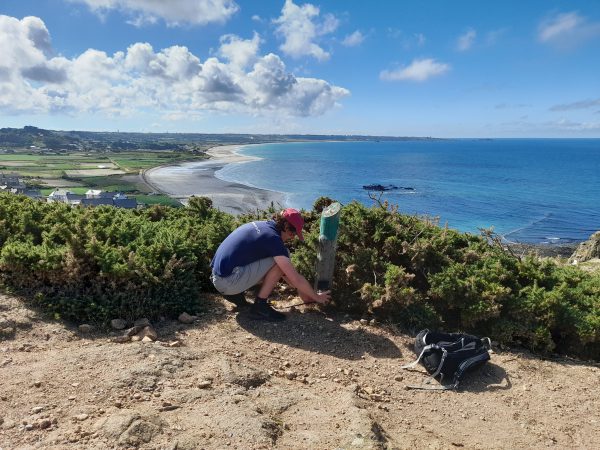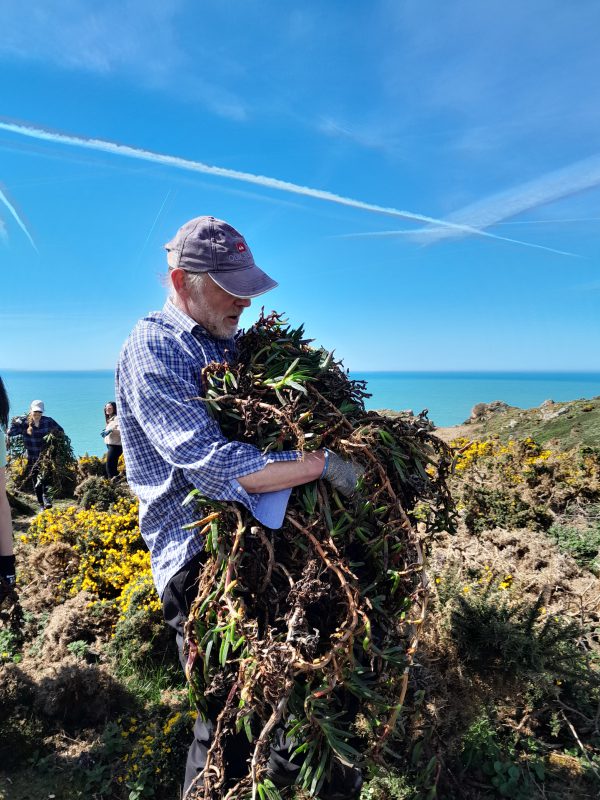
The Invasive Species team sits within the Biosecurity section in the Infrastructure and Environment department (I&E). The small team of two, Alastair Christie and Adam Dallas-Chapman, are supported by numerous local volunteers. Together they monitor for and provide scientific best practice advice for dealing with over 100 different invasive non-native species (INNS) currently found on Jersey.
Why is this work important and what does it entail?
Over 2,000 non-native plants and animals have been introduced to Britain from all over the world. Most non-native species are harmless but around 10-15% spread and cause harm. These are known as invasive non-native species and abbreviated to INNS. They are a problem because they:
- Harm local wildlife and the environment
- Cost the UK economy £2 billion a year
- Can harm our health
What does an average working day look like?
Managing and monitoring invasive non-native species is dependent on the season as different animals and plants are active at different times of the year.
At this time of year, the team prepare and run events for Invasive Species Week which is a UK wide event. The team engage with the public across the Island to raise awareness about invasive species, their impacts, and how they can be effectively managed in a collaborative manner.
Over the summer, the team shift their focus to monitor Asian Hornets and work with the Jersey Asian Hornet Group to track and destroy nests around the Island. Hornets remain a focus until autumn where nests begin to die down and queen hornets enter hibernation. When this happens, the team begin focusing on invasive plants such as Japanese knotweed which is best treated and managed during the autumn months.
In the winter, the team work with their counterparts in Guernsey to look at new invasive species which may pose a threat to the Channel Islands in the future and the potential routes they could take to invade if they were to arrive.
Alongside all this routine work, the team respond to any reports of invasive species. This could involve confirming the report, managing groups of volunteers to pull an invasive plant, installing camera traps in the countryside to track an invasive animal’s movements, or working with private landowners to effectively remove plants.

What’s particularly challenging about the role?
Inevitably, new invasive wildlife does occasionally enter Jersey. In these cases, it is not an easy decision to capture and eradicate these species. This is especially difficult when an animal finds its way to our shores and at times the team have found themselves battling against public opinion.
In 2022, the arrival of a coypu to Jersey brought this challenge to local attention when the public affectionately named the cute furry invader “Colin” after a photo appeared on social media.
Unfortunately, coypus such as Colin are one of the world most invasive rodents famous for their ability to breed quickly (16 pups in one year), and change areas of the countryside to suit their hungry nature and aquatic lifestyle – vastly damaging areas in the process.
In France, where Colin arrived from, coypus have effectively taken over areas and are often seen as public enemy number one. Mainly because the damage they cause costs the French public up to €65 million annually!
What can Islanders do to help?
Although Adam and Alastair are the central contacts within Government for Invasive Species, the fight against invasive species requires input from everyone!
Invasive Species Week promotes five simple things that members of the public can do to help prevent the spread of invasive non-native species:
- Keep any boats, clothing, footwear and equipment used in water free of invasive non-native species – remember to Check Clean Dry after use.
- Be Plant Wise and don’t let your garden, pond, or aquarium plants enter the wild.
- Take care of your pets, never release them or allow them to escape into the wild. It’s cruel and could harm other wildlife.
- Look out for invasive species and reporting them to invasives@gov.je if you spot any.
- If you enjoy being outside, volunteer with a Local Action Group working on invasive species management. Natural Environment work in partnership with the Decarbonisation of Government group to promote several volunteering events a year.

What’s particularly rewarding about the role?
Whilst our Island is small, Jersey has a unique mix of UK and European wildlife that’s worthy of protection. Without effective management invasive species would negatively affect our native wildlife until all we have left is our invasive invaders!
Working to prevent this is a rewarding role that allows both Alastair and Adam to work across Government, other jurisdictions, and alongside the public. Events such as Invasive Species Week allow a chance to reach all parts of Jersey’s community and to educate and collaborate together to fight against invasive species in Jersey.
If you would like to learn more about Invasive Species, Alastair and Adam are running several events throughout Invasive Species Week:
Tuesday 21 May
- Public stall at Le Quesne’s Garden Centre – Be Plant Wise – 13:30-15:30
Wednesday 22 May
- Public stall at Ransoms Garden Centre – Be Plant Wise – 10:00-12:00
Thursday 23 May
- Public stall at Elizabeth Harbour – Marine Invasive Species – 14:00-16:00
Friday 24 May
- Public stall on St. Helier high street - Invasive Species in Jersey – 09:30-16:30
Saturday 25 May
- Public stall on St. Helier high street - Invasive Species in Jersey – 10:30-16:30
 blog.gov.je
blog.gov.je